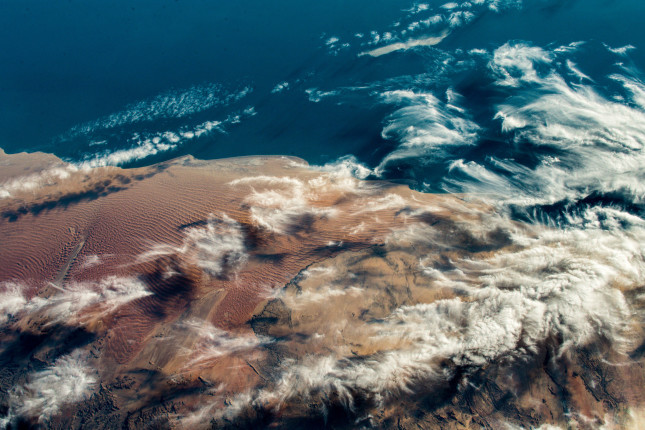-
New Security Beat’s Biggest Stories of 2018
January 9, 2019 By Benjamin Dills
In 2018, our readers came to New Security Beat to understand how individuals and communities cope in the face of environmental uncertainty, particularly when the rule of law, natural resource management, and social services are lacking.
Habitat loss and poaching has driven many species to the brink of extinction, and law enforcement bodies around the world are in a constant struggle to stop poaching and intercept traffickers capitalizing on the scarcity of endangered species. Our most read piece, by Wilson Center Global Fellow Sharon Guynup, investigated the threat to African Pangolins as poachers and traffickers shift their attention from the Asian Pangolin, already driven almost to extinction, to satisfy demand in China, Southeast Asia, and the United States.
Wildlife trafficking has become the fourth largest transnational crime in the world, and the danger extends beyond the environmental damage. “The same criminals that are trafficking in drugs, guns, and people, traffic in wildlife,” said Christine Dawson, director of the Office of Conservation and Water at the U.S. Department of State, at the Wilson Center last January, reported Saiyara Khan.
Where governance is weak, people seeking to escape violence and hardship are vulnerable to trafficking. Drought and instability have driven many in the Sahel to seek refuge in Europe, with Libya becoming the major route since the fall of former leader Muammar Gaddafi. Italian efforts to block migration across the Mediterranean have left 400,000 – 1,000,000 migrants stranded in Libya, where they are even more vulnerable to forced labor, torture, and trafficking, wrote Alexander Farley in our second most read piece of the year.
In Central America’s Northern Triangle, experts suggest that it is not just violence but also drought and the ensuing food insecurity that drive people to migrate. An effective response to migration, Carrie Seay-Fleming argues, must address the human and livelihood security concerns faced by people in the region.
While water scarcity rarely leads to political violence on its own, that scarcity can make the control of water an effective tool for groups that are motivated to political violence. Jennifer Veilleux and Shlomi Dinar found that water related terrorism by groups such as Al-Shabab, the Taliban, and the FARC, rose 263% between 1970 and 2016.
Like water and oil, fish has the potential to become a geostrategic resource and an object of conflict where governance is weak or absent. Jean-Pierre Larroque documented the flare up in piracy of the coast of Somalia in the Gulf of Aden as foreign fishing vessels clash with locals over the areas rich fish stocks.
Macrotrends, from urbanization to demographics to the melting arctic, rounded out the rest of our top stories for the year.
In Cape Town, a combination of drought, growth, and reliance on surface dams took the city to the edge of shutting off the taps. A Wilson Center Ground Truth Briefing analyzed what led to the crisis, the water conservation efforts that were preventing disaster, and what other cities could learn from Cape Town’s experience. In China, meanwhile, ongoing massive urban growth has led to an unprecedented demand for cement and the sand needed to produce it, leading to immense health and environmental impacts, reported Kimberly Yang.
Pakistan and Bangladesh, once demographic twins with young, rapidly growing demographics, have diverged since the 1970s. Richard Cincotta & Elizabeth Leahy Madsen analyzed what these different demographic paths could mean for the political futures of these two South Asian countries.
Finally, in the far north, climate change is drastically altering the arctic landscape, melting ice and opening new shipping lanes, bringing unprecedented attention to the region, both commercial and military. Steve Tebbe reported on the challenges a warming Arctic poses to the U.S. defense community.
1. Pangolins on the Brink as Africa-China Trafficking Persists Unabated by Sharon Guynup
2. The New Slave Trade: Migration, Trafficking, and Terrorists in Libya by Alexander Farley
3. Avoiding a Water Crisis: What’s Next for Cape Town — and Beyond? by Wilson Center Staff
4. New Global Analysis Finds Water-Related Terrorism Is On the Rise by Jennifer Veilleux & Shlomi Dinar
5. Beyond Violence: Drought and Migration in Central America’s Northern Triangle by Carrie Seay-Fleming
6. Somali Pirates Return as Illegal, Unregulated, and Unreported Fishing Continues in the Gulf of Aden by Jean-Pierre Larroque
7. The Crushing Environmental Impact of China’s Cement Industry by Kimberly Yang
8. “The Damn Thing Melted”: Arctic Security in the Blue-Water Era by Steve Tebbe
9. Bangladesh and Pakistan: Demographic Twins Grow Apart by Richard Cincotta & Elizabeth Leahy Madsen
10. Criminal Elements: Illegal Wildlife Trafficking, Organized Crime, and National Security by Saiyara Khan
Photo Credit: West coast of southern Africa, October 2018. Photo by Alexander Gerst, courtesy of NASA.
 A Publication of the Stimson Center.
A Publication of the Stimson Center.






